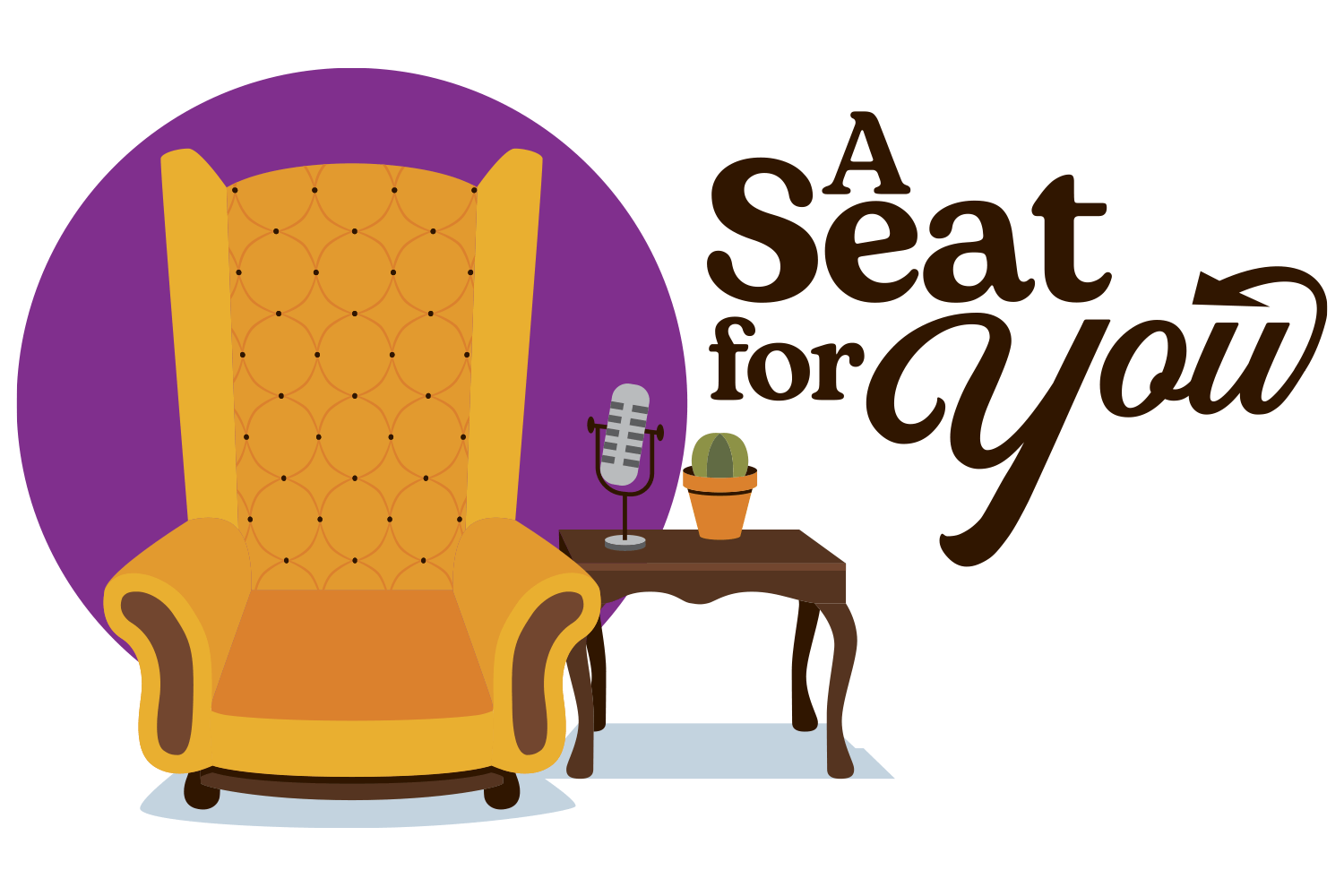Episode 8- Tamed:Toxic Experiences at Church
Leslie: Hey everybody and welcome to another episode of A Seat For You podcast. Number eight. Number eight. Wow, we're like numero ocho. Making headway. Um, so today we recorded a little bit differently. We actually recorded the body of the podcast first, uh, and now we're recording the intro afterwards. Um, but we did that for a purpose because we didn't really know what was going to come out of April's mouth this week.
So, uh, today you're going to, yeah, today you're going to hear a story, um, about Personal experiences that Abrel had within, um, her past church. And, uh, I personally think that you're just gonna be, like, just floored when you hear, when you hear these, these things.
April: But, uh, it's Personal experience also known as [00:01:00] weird church crap.
Leslie: Religious trauma. At your finest. Um, so yeah. Hope you enjoy. It's really about, um, you know, boundaries. I think boundaries are something that we all need in our life in some form or fashion, whether it's boundaries at your workplace, boundaries with family, um, boundaries with friends, um, but it's very clear that if you are a part of a religious institution, You need some boundaries there too.
April: Well, understanding you need them is key. Yeah. Awareness. Yes, awareness. Awareness is key. Figuring out that it's okay to set them. Yeah.
Leslie: So, um, Yeah. We're just gonna, we're just gonna jump right in the conversation. So, just, you're just gonna be joining right in the middle. So, have fun.[00:02:00]
April: Well, when I was thinking about what we were talking about today I was like, well is this Is this considered like a spiritual abuse situation or was it just, is it just weird? Because it could be like both. I don't want to be overdramatic and be like that spiritual abuse if it's really just odd. You know what I mean?
If it's just like a weird boundary behavior. And so I kind of, I Googled it. Oh, I Googled
what is considered spiritual abuse. And chat GBT. Actually was answering me on the side of the screen. So Google was coming up, but over here, chat GPT was already working. And like just line after line after line of, if you don't know how chat GPT works, it takes information that already exists on the interwebs and basically [00:03:00] formulates an answer.
And that's what it was doing. And it was interesting because I was like, look at you chat GPT, you know what you're talking about. So this is the way. I didn't even look at the Google things. I looked at what ChatGPT said because it's gonna compile everything I'm gonna find and so it says Taking someone's oh, well this I asked is taking someone's book away considered spiritual abuse And so it's like this seems like a really silly question or like something a fifth grader might ask, you know Mm hmm, but I was an adult and so it seems like I felt like a child in this moment, so I guess it works.
And so ChatGPT said, taking someone's book away by itself is not inherently considered spiritual abuse. However, whether it constitutes spiritual abuse or not depends on the context and intent behind the action. Spiritual abuse typically involves the misuse of spiritual [00:04:00] or religious beliefs to manipulate, control, or harm someone emotionally, psychologically, or physically.
Or physically, if taking someone's book away is done with the intent to control their access to certain beliefs, ideas, or knowledge, and is accompanied by coercive or manipulative tactics to enforce a particular spiritual religious perspective, then it may be considered a form of spiritual abuse. Well, there you go.
However, if taking someone's book away is done for reasons unrelated to their spiritual or religious belief, Such as concerns about the content being inappropriate or harmful in a different way. It may not be classified as spiritual abuse. Right? So which is it? You know what I mean?
Leslie: So, oh, okay. Time pause, time out.
What do you mean? Which is it? Okay, we need to back up. Okay. You first. We need to set the scene so the people understand what we're talking about. All right? So, okay. Because, because I. It worries me that you have a [00:05:00] question. Like I'm, I'm worried now that you're, you're confused. I feel like you have 42 years of brainwashing done that is stopping you from seeing the clear answer here.
April: Well, it's like I saw the clear answer until I read that other paragraph. Because then it's, that is, that was where, like, I feel like that was their mindset. The second paragraph encompasses what they were thinking. Right. So, let me tell the story.
Leslie: Yeah, let's, let's set the scene.
April: Okay, picture it. Picture it. Transport yourself here. 2019? 20? 20, probably. I think it's COVID year. Maybe 21. Yeah, I, I don't think it was really that long ago.
Okay, maybe 2021. At the, at the previous religious facility I was attending, I'm not going to say names. Um, [00:06:00] I was involved in a situation where I was kind of in the middle of, I won't say in the middle in a bad way.
I was in the middle in kind of a, uh, like the guy in the middle of a wrestling rink. The referee. Is he, is he still called referee? Mm hmm. And there are people in the corners duking it out and I'm, You know, the Enneagram nine trying to like be the peacemaker. And so I was in this situation between two of my really close friends and they were dealing with a pretty nasty divorce in which one of the parties was kind of upheld in a way they shouldn't have been.
And by the church encouraged in. You know, there was a lot of like support and backing there. Whereas the other party was the offender and they were not treated [00:07:00] the same. Right. And the whole situation was really kind of messed up in it.
Leslie: So the church got pulled into a divorce. Well, because the people that were involved in this marriage were within the church, kind of,
April: right? Yeah, they were in the church and they both served. Um, they both had leadership type positions and, um, things that had accumulated over, over decades time came to a head and my one friend always knew that she'd be considered the bad guy when all of this was said and done, even though Behind the scenes at home, it was a completely different dynamic that they didn't know of, but they're always going to uphold the man.
I'm just going to say it. They upheld the man and made sure that he was getting good on his feet, but still considered way more grace for the dude, way more grace than for the woman, [00:08:00] right? So there's the setting. And I was reading a book at the time by Glennon Doyle and what's that book called? Um. The cheetah one?
No, that's not the cheetah one. Yeah. Is it the cheetah one? Untamed? Untamed. So I was reading Untamed. And it's a really good book. And really it's about, you know, kind of finding your own voice and kind of standing your ground and, you know, trusting that your gut is not lying to you and, you know, just kind of like finding your strength within yourself after being smashed down for a really long time. That's basically the premise of the book. And so, I thought it'd be great for her to read. And, so, there was one night, She had not got home, or she was inside the house or something like that. I was dropping off a book or something. I was dropping it off. Well, husband comes out.
This is before, you know, everything was final. They were still living [00:09:00] in the same house. I hand the book over. I should have never done that. And he never actually gave it to her. He actually flipped through it and read some of it and then turned it into the preacher. So basically turned it into the principal's office, never even let it go through the hands of the person it was supposed to go to.
And so a little while later, maybe a couple of days, I don't know how much time went by. I get called into the principal's office. I say the principal's office because as a child, I lived in the principal's office. I went to a private school. And I was just in trouble all the time. It was talking, being too active, getting out of my chair.
I don't know. I can't help that I was smarter than everybody else and I was bored. And so I got up and helped people with their things. And I got tallies all the time. I got hullabaloo tallies. Do you know what hullabaloo means? I don't know what a tally is. It's a pipe cleaner cut in half. That was what our tallies were.
And everybody had a cup with their name on it in [00:10:00] each color pipe cleaner. Tally meant something else. So if you got like a yellow one, you were kind of being disruptive. If you got a blue one, it means you're making noise. So hullabaloo means noise, and I got the hull blue tallies all the time. If you get a red one, like two red ones, you go straight to the principle.
Got those a lot too. Anyway. And so this, this situation felt just like that. I reverted back to my seven year old self that felt like she was about to get paddled because corporal punishment was a thing back then. And I, I got paddled so much.
Leslie: Was this a...
April: It's a wonder I have a butt.
Leslie: Was this a religious school?
April: Yes. Okay. Um, got locked in the closet there. That's another, that's a whole nother
story. That's, that would trigger an investigation, I feel. Now
it would, for sure. I'd be like on... Bay News 9. [00:11:00] Yeah. Anyway, so this situation kind of triggered that PTSD, and like when I was asked to come in. And like, you know, the pastor, super sweet guy.
I've been friends with them a long time, and so he kind of is a little bit like my personality where he doesn't want there to be conflict, but he knows that he has to like deal with people on certain things and like resolve the situation because you got to like make everybody happy. And so I get called in and then I'm called in with like another pastor as well.
So you've got two pastor, men pastors in with a woman by the, by herself. And I'm getting questioned about this book. Like, what was your purpose of giving her this book? And I'm like, is there like subliminal Hitler messages in it? Like, why am I being called in here for this book? I really couldn't understand why.
And basically it was said to them [00:12:00] that it was encouraging divorce. It was encouraging her to leave him, which was the fear anyway. And so it, it was like, I was encouraging her to leave. And I'm like, that is not the case. So I had to sit there and explain myself as to why I chose to lend my book to her.
And it was like an hour and a half, two hour long conversation and me having to explain why I thought she should read it. And if they actually read it, they would have understood, but they were not taking my side on it. Lo and behold, they kept my book. They never gave it back to me. And then I went on with my merry way or whatever when the conversation was over.
And so that is why I looked up. Is that considered spiritual abuse? Because when I came back and I shared this with Leslie, she was like floored. [00:13:00] She was about to drive up there and, and get it.
Leslie: Well, also because another reason was I actually pre ordered this book for you to be autographed by Glennon Doyle. And so it was. It wasn't just like a book you ran down to Barnes and Noble and picked up off the shelf. Like, there was a reason you had this.
April: Her hand was in it and she signed it. Right.
Leslie: And so then you were gonna lend it to a friend to read and then it gets confiscated by the establishment. Right. This is my point of view.
By this religious establishment who, in my opinion, I'm like, who the hell do you think you are? Like, who, who, who authorized you, I sound like an owl, who authorized you to be the, the law and order pastor of what someone in your [00:14:00] congregation is allowed to read in their free time. And then you keep the effin book?
Like, I. I still, I feel like it just happened right now. Like, re listening to this story.
April: Your shoulders are up by your ears.
Leslie: Yeah, because it, it infuriates me. I mean, it's just like, and then to hear you read at the beginning of this, the two different versions and you're like, well, I don't know, maybe they weren't coming from their perspective, they saw it as harmful content.
Right. Well, from their perspective, they think women should be barefoot and pregnant in the kitchen.
April: Well, that might be a little extreme.
Leslie: That's it! Feel free to weigh in on our, on our website. Yeah, so, do you feel like this was spiritual abuse or not? I'd like to know. I'm gonna lean towards, yeah, I think maybe it was.
April: But I do also, the problem with me, and you know, being grown, raised in this environment my entire life, and also being someone who's able to see both [00:15:00] sides of almost everything, is that I can see both sides. I see where they were coming from, where they would think, Like, well, I don't, they were, I guess there was so much fear in that this one little book would put her over the edge.
Leslie: Yeah. But just because you can see their side doesn't mean their side was right. Right. Now I get it. Okay. Just because you can understand their point of view. I mean, I can understand the point of view that they're coming from. Like I said, they have a very clear agenda. Very clear. It doesn't mean it's right.
They had overextended their reach into the lives of private people. And the fact that, first off, any type of organization or business Should never have two men and a woman in an off closed door office, right? Okay. I don't care what kind of, if it's a church, if it's a business, if it's a school, that is a bad look from the very beginning.
April: And I, [00:16:00] and they typically, I don't think would do that, but because I'm like, ironically, I'm like family to them. So it probably didn't seem like the same situation. I would be like, uh. A sister or a best friend in the room with them, you know what I mean? And so I think that that's probably why it was okay in that moment for them.
But like looking back, I, that was not, that was very intimidating for me. And so for me, I, and I don't feel like I, I feel like I'm getting better with this, but if, if I'm being like, come at with something or being like questioned. In a negative tone, I kind of like shut down and my words that I would have, don't come out the way that I would like them to.
And so of course I've had so, I've had this conversation with them like a thousand times [00:17:00] since then with all of the things I should have said or could have said or would needed to say, but I didn't have those words then. Probably as soon as I got in the car, I did. Had some, but this is a, this is one of the situations it's kind of added to others that we'll talk about.
Leslie: So you also brought this up to your therapist.
April: I did, but I brought it up in addition to the other things. Because there was also the time that I was called into the principal's office because I was seen on Facebook in pictures with you. Who has short, spiky hair. It is obvious what you represent to them.
And so I was called in for questioning because I was hanging out with someone. With a member of the alphabet mafia. Right. And my question to them, which I was proud of myself [00:18:00] for being able to actually voice this in the office, because it was just mind blowing to me that what, what they had was a picture.
Or someone stalking my Facebook, and I was in a picture with someone who had short hair. So obviously that person represents something bad, right? Mm hmm. Only because of your hair did they know that. Right. So they made an assumption off of what you looked like, that that's what you represent. Right. So I said, so if she had long hair, I wouldn't be here right now?
And they were like, well, you know, No, if she had, if she looked a little different. Right, if I looked more feminine. I wouldn't have been there. I would just, I would just like a girlfriend. Because I don't get questioned with my, when I take the same picture with any of my other friends. Right. I don't get called into the office when I take pictures with them.
Right. And so it went from that hmm.[00:19:00]
And it doesn't matter if they were right or wrong, it was the way that it was brought up. Right. And it was the way that it was handled.
Leslie: Again, clearly, overreaching, crossing boundaries.
April: And even by their own standards, it was the incorrect way to approach a situation. Because, biblically, if we're gonna, we're gonna throw that in there, because that's what they thought they were, thought they were doing the right thing.
If you consider someone a friend, which again, I've known these people decades at this point, we definitely would have considered each other friends. We've been to each other's houses. We, our kids have grown up together. We've been involved in each other's lives for a long time. It's a lifetime. You, if you see something questionable, if I see one of my friends and it looks like they're cheating on their spouse, am I going to go straight to the preacher?
You know, what a [00:20:00] crappy friend am I if I do go straight to the preacher with it? You go to your friend, be like, Hey, what's up? Is there something going on that we could talk about maybe? Or I have some questions. Can we talk about something? I'd be happy to talk to you. You may not agree with what I say, it doesn't matter.
But you come to, you go to your friend and you bring it up to them in that way. And then if you still see something or whatever, then you bring a friend with you or your spouse or whatever. And then you kind of bring a second person into the conversations where there's like three of you talking. Then, if it's still that way, and you still have questions, and you don't feel like anything's being changed or different, only then do you talk to maybe the person in charge.
In the patriarchy. We'll go there. That's when, that's when I should have been called in. After all of those other things happened first. But [00:21:00] this didn't happen just one time. I think it happened three different times.
At this point I feel like I've spent so much time in there that I don't even remember how many times it was. At least twice, possibly a third. And I think it was about to happen again right before I'm like, you know what, I'm, I'm kind of, I'm pretty done with this place. Yeah. It was about to happen again and I was like, uh, so, so by their own standards, even by that they did it wrong.
It was wrong. The way that they threw just literally just threw me under a bus. Mm hmm. And. Then when I, you know, decided to leave, I get, you know, messages. I thought we were friends. Are you kidding? A friend doesn't treat somebody like this because I know good and well you wouldn't have done that to any of your other friends.
That you, I see you hanging out with. [00:22:00] You don't go straight to the person in charge or whatever. You, you ask them about it. You talk to your friend about it if you see something going on. You know what I mean?
Leslie: Oh, oh, I know what you mean because I would never, I don't understand this going to, uh, going to somebody else that's in charge. Like, I guess that's my question for you is like, what kind of environment is, is this?
April: At one point during one of these, you know, uh, situations when I was in the office, at one point there were three men in there with me. Hmm. Yeah. That's not intimidating at all. Right. And so I did not have the, again.
Didn't feel like I could say all that I really needed and wanted to say. Right. I said enough.
Leslie: Well, they weren't going to listen to you anyway. I mean, think about it. If they had the audacity to pull a woman into an office to discuss these, she said, he said. [00:23:00] Crap. Oh, oh, I saw a picture. Or, oh, you're reading a book, or, oh, like if they already had that kind of audacity to feel like they needed to pull you into a closed door session and discipline you,
right.
April: You're not changing their mind down to, they wanted me to admit to things so that I could step down off of being on the worship team. Oh, I could still attend church there. Thank you very much. Right. But I would no longer be able to be in any kind of leadership position. Hmm. If there was, you know, a relationship or anything like that.
Leslie: Right. If you were a sheep that was led astray. And so, yeah, and so like... You're not allowed to play the drums. a...
April: I couldn't be in any leadership position.
Leslie: I gotta tell you, man, like... [00:24:00] I just think...
April: I, and so with that, you, I mean, you add that to like where my thoughts were already going with this, you know, like learning more and more about how harmful the system I've grown up in can be to people who are outside of it. Mm-hmm. . So you add that to that and it was the, it was the last straw for me.
Mm-hmm. , I was done.
Leslie: Why is this how churches work? Like, how did this even start
happening?
April: What? Bringing people in? Like, what? What do you mean?
Leslie: Yeah, like, who? Why is that the process?
April: Well, you got people in, and now if I was not someone in leadership, they may have been handled differently. But someone who was like in leadership, which is why, you know, like my friends that were going through the divorce, why that was such a big ordeal.
Because they were, we were all in leadership. [00:25:00] And, um,
so just because you are in the band makes you a leader. Yeah. Well, you're in a leadership position. Technically. Yeah. Even though I would sit behind a plexiglass cage every day, I don't really talk to people from, from there.
Leslie: That's a really like interesting controlling manipulative system.
Well, I mean, just, just because somebody wants to. , like use their talent and play music for a group of people. You get treated like this for anything that goes on.
April: Well, 'cause you have to be above reproach. Basically. You have to yourself, are you Jesus to a different standard? No. Are you Jesus? But if you are a teacher or a leader, you have to kind of basically live by tighter rules if you're an example.
And so if I am. You know, Out there, you know getting [00:26:00] sloshed on Saturday night and then coming and being a leader on Sunday That's kind of weird, right? Mm hmm. Well, I mean, that's how I've been raised like you don't you don't show up Sunday hungover from Saturday. Mm hmm, you know or you know if I got high Saturday night and then led worship the next day That's not a, like, a Christ like attitude.
Leslie: Right, but if you read Glennon Doyle's book, that also isn't a Christ like attitude, apparently.
April: It's, right, no. You're, right. No, I'm not sure they would have, like, you know, fired me from, from my position over the book. Right.
Leslie: But. So I guess, for those of you who may not understand who Glennon Doyle is, apparently she was like a, A rock star of the Christian community for a long time.
Christian mommy blogger. Um,
April: yeah, she, she traveled with women of faith, wrote lots of books. I saw her speak on several occasions [00:27:00] while she was still married to her husband. Um,
Leslie: and then, and then she had a, an amazing light bulb that went off and she actually realized that, um, she was not, uh, Um, met to be in a heterosexual relationship and found love with Abby Wambach, U. S. women's national team, soccer hall of fame, legend player. And, um, you know, if you, if you don't know who she is, I definitely encourage you to listen to the, we can do hard things podcast and, and read, read the book and, and get
to know, um, it's not encouraging you to divorce your spouse.
April: No, it's the opposite, encouraging you to find your own voice because you are your own person. Yes, when you get married you're supposedly one unit, whatever But you're still your own person. You still have Yeah, two separate parts two separate lives. Yes, and it's okay to make your own decisions and [00:28:00] think for yourself Which is like, you know, well, that's really hard for like our parents and grandparents It's a they are like so connected that they won't make decisions on their own Well, they don't that what I'm learning every day Every day, I'm learning that the organized church, especially certain denominations like Southern Baptists, um, they don't want you with the autonomy to make your own decisions.
Leslie: They want you to be as submissive as possible and rely on your husband or your pastor. Or your congregation to lead you down whatever path they want you to go down and they want to make the decisions for you. I mean, again, episode one, they gave you a fricking pamphlet to tell you how to vote. They don't [00:29:00] trust that you can make any kind of, uh, decision on your own.
And it's baffling to me. It is so baffling the control and the manipulation that this, that these organizations have over people. And I'm so thankful that I was not raised in the church. So, so thankful.
April: Well, maybe that specific kind, I mean, there are, there's definite like positive things because there's a community, you know, I mean, there's definite, I don't want to like just bash the church.
Leslie: Well, I have community outside of the church. All those things exist. I think, I think when you are old enough. To then learn, like I'm learning now, I'm not talking about Jesus because I actually am enjoying learning about the teachings of Jesus and, and all of that. So, don't get me wrong in thinking that I'm lumping it all together.
It is the organization of the church. Right. That is the issue. Yeah. [00:30:00] They are, they do not operate in a space that acts like Jesus or that, you know, what, what is coming out of their mouths on a Sunday? Is. It's not what their actions show Monday through Saturday, and it's, it's very clear with everything else that they're involved in, right?
But this is just one little sliver of an example of how warped their minds are and how much control that some of these pastors think that they have over the lives of other people to where you think you have in, in, in this great free country of the United States where everybody has a Freedom of speech and first amendment rights that you have the power to bring someone into your office and take away their own personal belonging.
April: No, I never asked for it back either. But they, I shouldn't have had to ask for it back.
Leslie: You shouldn't have ever [00:31:00] had to be in there in the first place. It's none of their freaking business what books you read.
April: It's nobody's business. And I think what it boils down to and for that situation especially. When someone cannot effectively communicate with their spouse because they've never been able to.
They couldn't communicate that concern with that, with their spouse because they never actually went to my friend to tell her that I brought a book by. Right. He went straight there because he doesn't know how to communicate, did not know how to communicate with his wife. That's, that is a, in your home, private argument if you want to have it.
But he didn't know how to have that argument or communicate, which was very foundational in this whole thing. Mm hmm. And so he used somebody else to communicate it. Right. Instead of, you know, like if you're a sibling, instead of just like going and having an argument with your brother or sister, they went [00:32:00] straight to mom.
Right. Straight to dad. Handle this for me. Very weak minded individuals.
Like, I'm going to whine about this so you can handle it for me. Yeah. So, but yes, I took this to my therapist actually pretty recently because I woke up one night and it's been more than one time, but in the middle of the night I woke up and my mind just clicked on literally like a light switch and I was replaying this, these scenes in my head.
It's been almost two years now and it probably has been two years since I was first called in there. I It's been a while now. Um, and for some reason, these scenes like a movie were just playing in my head. And I was getting like angry about them all over again and upset because it was painful and it hurt because of who these people were and how I was being treated with it.
And, and so in my head, I was like [00:33:00] saying all of the things that I wish I would have said. And I wish I, you know, I wish you can like, Have your brain make notes for you so that you can read them again when you actually do wake up out of your oblivion. Because I know that what I was saying was really good, but I don't remember every word.
Because I was kind of in that state of mind where you just allow yourself to say things and you're not hindered, you know? Mm hmm. And, and so I was like, I should not be... Um, having these conversations still, I shouldn't still be upset about this because I could not go back to sleep after this one particular night.
And it, I think I woke up around three or four in the morning, never went back to sleep because of it. And I would, apparently, obviously I'm still upset about something, I'm not over that. And so I brought this up, told her the whole thing, my therapist, and she kind of looked at me sideways like, what? They did, they had, [00:34:00] they said what, like, it was very confusing.
So when you go outside of like your bubble and you tell people things, they're like, are you serious? And so sometimes saying them out loud, you feel even more crazy because you're like, yeah, that does sound kind of odd. Sounds a little messed up. And so my homework was to write them a letter with all the things that I needed to say in it.
And, you know, I can burn it on the burn pile if I want to.
Leslie: Or you could mail it to them.
April: No. No.
Leslie: I mean, I'll drive it up there and deliver it.
April: I'm sure you would. I will drive it. They'll know exactly who you are.
Leslie: I know. My picture's famous, apparently. My hair's a little longer now, so maybe they're confused.
Yeah. Maybe. Um, do you want to share what you would say to them, or? Do you have any lines of, of one liners that you feel like you would have, if you could [00:35:00] recreate the scene that you would like to throw out there into the mix?
April: So, I think I want to share the letter that I wrote. And it may not be the same words that I dreamed about that I said, but it's from my awake heart.
So, okay. Here it goes. Dear people of the institution. To the specific ones who decided that their being right was more important than my their friends and air quotes well being I wanted to share how these moments have impacted me But first I want to advise how things should go should another friend get thrown under a bus First if you notice something off or concerning about a friend whether it be a book or a post or whatever first consider if you are truly concerned or if you just need The information to report so that you can feel as though your life isn't so bad.
If you've done this and still find yourself concerned, [00:36:00] call the friend up. Ask to talk over the phone, over coffee, whatever, but go to the friend. Not to a friend of the friend, not to a different friend, not to the principal's office, to that friend. A lot would probably get cleared up, and if not, it would at least open a line of communication.
Second, if your concerns are derived off of Facebook or any other social media, consider your own social media accounts and how much of what you post gives the whole story. Next, if after these things have been truly considered, you still feel a necessary to involve others, have the decency to show your face.
When others ask your friend to come for a meeting, not joining in makes it obvious that you aren't sure if this is what needs to happen, or if you were just being. A tattle tits. Ha ha ha. I was going to say tattle tail, but I didn't want to say that. And if for nothing [00:37:00] else, just so that your friend isn't alone in an office being interrogated by two men.
Lastly, if the hairstyles of my friends or whomever I choose to share my time with is so important to you. Maybe consider why I share my time with certain people and why that isn't you. In order to be Christ like, you have to actually think like Christ. You have to ask all the fruitful questions regarding what you're doing, and really understand what you're trying to accomplish.
Is it loving? Is it patient? Is it peaceful? Is it kind? Is it good? Does it point to joy? Does it exhibit faithfulness? Does it display self control? And so on. If the answer to any of these is no, then it's possible that the speck you're trying so desperately to remove from your friend's eye, you can't see good enough because of the log in your own eyes blocking the view.
But understand this I forgive you and I thank you[00:38:00]
because this has allowed me to see things as they really are It's freed me from the elephant sized anxiety that I didn't know I was carrying I've grown more in two years than I have in ten and I've learned more about Jesus being outside the walls than I ever did In it in short I finally get it and I pity you and others like you because I fear you wouldn't you never will So again, I forgive you and I forgive me Sincerely, Sincerely, your friend.
Leslie: That was a darn good letter. Thanks. How do you feel like getting that off your chest?
April: I feel better.
Leslie: Do you feel like a weight is lifted?
April: Yeah. [00:39:00] Like maybe I won't wake up in the middle of the night with dreams about it anymore. Right.
That's sad. Cause it doesn't matter if they ever actually hear that, you know? It wouldn't, honestly it wouldn't. Would it make a difference? Probably not.
Yeah. It always, it takes something.
It takes something that's going to affect them personally.
Leslie: Yeah. Well, I'm proud of you. Thanks. That was, that was a good job in, um, a very...
Vulnerable thing to, to share with the world.[00:40:00]
April: So I think that we can resolve that boundaries are necessary in your life, no matter where those are going to be placed. You know, and a lot of times when you're raised in church and you've always been involved, I've never not until, you know, these last couple of years when I've decided to just be a member of church and listen.
And not be committed or obligated in serving, which I've never not served. Like as soon as I was old enough to serve, I was serving. And I think when you've been raised in that, it's, the boundary lines, they definitely get blurred because you feel like you always have to say yes to things and you, when you feel, when you do say no, even if it's like.
thing for your physical [00:41:00] well being, you have immense guilt for it. And then if you like, if you do say no, you stick to it, you will like, make sure everyone knows that there was a reason. So like, you know, over explain yourself. Yes. And so growing up, like we never missed a Sunday. We never missed a Sunday.
And I missed Wednesdays because I was at the gym, but we didn't miss church. And if we did. Like I remember my mom would call my grandparents to let them know they weren't going to be there. And why? And so like, and now you have, you know, social media. And so I'll see, I can, I can see behind people's posts so well when they're like somewhere else on a Sunday, or they just didn't feel like, maybe they just didn't feel like going, you know, like maybe you're just tired and you just need to sit home for the morning.
Or, you know, if your kid has a sports game, which that's a whole nother podcast. Because some people are, like, really against kids playing sports on Sundays. [00:42:00] Anyway. But I'll see it behind a post. Um, decided to go do this. I sure hate missing Sunday mornings, but I'll be watching from the TV. You know, like, they're making sure you know that they're still gonna watch it.
Even though they're not physically there. But they needed to let everyone know that they didn't just not go.
Leslie: That's just so not what jesus is about.
April: Right. But I'm saying like, when you've been raised in that, you, you blur, the lines are very blurry and it's hard to know what is about, what, what should be a boundary and what is just par for the course, like what is just like part of the territory.
Leslie: You, you've drank the Kool Aid your whole life.
April: That's what I'm saying. So it's hard to know where the boundaries are. So, you know, ask a preacher's wife about boundaries. That's really tough, you know, but you still have to have them. Hmm. And it's important to understand that A, it's [00:43:00] perfectly fine for you to have boundaries.
Jesus had boundaries. When Jesus needed to be alone, Homeslice was alone. He went into the forest. By himself. He took naps. You want biblical? Go read about it. It's in there. Mm hmm. He had boundaries when he knew he needed to rest because he's been dealing with whining people all day long. He went and rested.
He did what he needed to do so that he could be fresh for people the next day. And we don't do that. Mm mm. We run ourselves ragged and say yes to everything. And then we're giving 40 percent to everything. You can't give a hundred to everything. And then like with ministers, it's a, it's been a big problem.
And that's why there's a lot of like divorce and marital issues within like preachers and ministers, because they don't know whether or not to put, because church and God are different. God first, your spouse, [00:44:00] second, children, church. But people put church and God, ministry, all of that is in the same block.
And so that gets put number one, and then you have crap leftovers for your family. And then you have no relationship with your family. Don't spend time with your family or your kids. It's all about church. It's all about ministry. It's all about being there for everyone else, but not there for you and not there for the people that you have been entrusted with.
And so those boundary lines are very hard for people who've grown up like that or been in that for that long. So now being just on the outside of it, I can see how very important it is, not just for your own, like actual health. Because I can tell you the moment that I stepped away from this environment, it was like an elephant got off [00:45:00] my shoulders.
And I didn't realize there was that much stress involved because it was like I was showing up every week. And you just bury it. Is this going to be a thing where I just cry every podcast?
Leslie: Well, I mean, I think it shows how painful this experience is and it's like, it shouldn't be. That's not what. Religion is supposed to be about and I think that's why there's so many people in this whole Deconstruction movement because they realize that it's so toxic I mean some of the some of these things that you're sitting here explaining Sound like a freaking cult you know, it's like if They brainwash you they control you they manipulate you they they make you To [00:46:00] where you have to walk on eggshells if you need to do something else on a Sunday and not show up.
You know, they put guilt on you. Like, all of those things are not healthy things. You know?
April: A lot of, shame. A lot of shame.
Leslie: Yeah, and shame is a powerful tool. You know, and, and they can wield that shame and throw it around like,
April: like shame is in the same vein as fear. You don't have shame without fear. You don't have fear without shame.
And yet we preach from the pulpit that there's no fear in Jesus. Their perfect love drives out fear. So what is that saying? Right. That we are not operating in the vein of Jesus. We're operating in the vein of fear. Yeah. Well, everything that we do has shown itself as fear. The politics [00:47:00] we're involved in.
You know, like all of the, the fear around certain types of people, like it's fear. It is all fear.
Leslie: Well, it's also control that, right. That fear is driven by the power of, or the, the, the wanting and desire to maintain control and power, right? Because if they can make, if the narrative can make you fear fill in the blank, Then they always will control and have control and power over you because they can control the narrative.
Right. So it's, it's a really smart plan. I mean, look how well it's done for, for religion. Yeah. You know, it's a tax free billion dollar empire. So it's Scientology. That is filled with, with, with patriarchy and social injustice. [00:48:00] And, I mean, it's, I don't know. I, I know that you do say that you got a lot of good out of it. And that's fine. I'm not saying any...
April: You know, I have a lot of great memories and I think that's why there's sadness behind it.
Leslie: Yeah, but it, you don't have to leave it all behind.
April: You're not... I know, but you're still mourning, like, you're losing that part. Because you're in a different phase of life and it's like you're mourning the good things.
Because, I know people say you don't have to throw the baby out with the bathwater, but you kind of, you kind of do sometimes. Not an actual baby. I'm saying like, you know, sometimes you gotta, when you're walking away, you gotta walk away from all of it. Right. And so I think I, I mourn that because I would no longer be kind of on the same page.
Leslie: Because people haven't, [00:49:00] Grown or changed or seen things in a different space because everybody's on their own paths. Right. So where you might be going down a different road, some of your friends or past friends may not be on that road.
April: Well, even like myself, like even five years ago, if I saw me, or, you know, if I, if I came across a friend that was finding themselves on the same path that I'm on right now.
I may have concern for myself. You know what I mean? Like I might be like, Ooh, you better be careful because I hadn't stepped out just enough yet. Oh,
Leslie: I know. I mean, I, I witnessed it firsthand. I saw it all happen up close and personal. And it was very frustrating.
April: I'm sure it was. Because I also like, it probably still is because I'm not, I'm not done with it.
Leslie: I'm not. Yeah. But I mean, I think I. I think I understand it differently [00:50:00] now, like, whereas before, because I, I didn't understand the environment. And I mean, I'm not going to sit here and pretend like I understand fully like you do, because I did not come up in that, right. But from what I've learned from you and, and have seen with my own eyes, it's, it's not as frustrating.
I, it more, it just makes the situation makes me angry that, that there's a group of people out there that have the ability to do this to people and get away with it and, and, and do it with like, we're doing it for God.
April: Yeah. And I mean, I'm not, I, I know people who have had way, way worse experiences than I had. You know what I mean? Than that. And I'm lucky to have been able to. Kind of leave on my own terms quietly, you know, whereas there's been people in [00:51:00] similar situations where it wasn't quiet and it wasn't on their own accord. You know what I mean? Like I was not asked to leave. I was, you know, that would be even more traumatic.
I chose it on my own terms and I think that was helpful, but there are people who obviously have been through far worse than that.
So, but I, you know, back to what I was saying, like I was, it was exhausting to walk in there every day or every Sunday or whenever I was there and put on this like wax coating and hope that I was exactly who people already thought that I was.
Hope that I was living up to myself basically. Mm. And while Um, my heart never changed. I've never, my heart's never altered from anything, from any of my [00:52:00] beliefs. From day one, I've been the same soul this whole time. It's just the knowledge, the power of knowledge that people have about me will literally change your environment, you know, and some people have that knowledge and others did not.
And. You know, I was trying to going in there and pretending that I was this unblemished human being and I couldn't, I couldn't handle that anymore. And I was never in their eyes. I would never be not, I would never not be, you know what I mean? Never not be blemished. Yeah. You know what I mean? Like there will always be, I don't know, like a little,
Leslie: like a stigma, like a little gray cloud following you all over the place.
[00:53:00] Yeah. And
April: then, you know, people talk, you know, and church people talk the most and who, I don't even know who knows at this point of, you know, all the things and I'm sure there's a great amount of people and I just don't care because I can't, I can't put any more energy into. Who knows my business and who doesn't.
Yeah. As long as the people who I know care about me and have unconditional love for me, for wherever I am at in my life, and encourage me to grow, and encourage me to continue to learn, and seek the things that I need to seek. Those are the people who get to know all the things with me, and get to be part of my life.
And I can't... I don't reserve it any longer for those who have no care of that. Right. They just want the juice.
Leslie: And lucky for you [00:54:00] listening, you also get to have part of April's life. Because you get to eavesdrop on these conversations.
April: Yeah, as long as you don't go talk crap. Ha ha ha ha ha ha ha ha ha. Come for ya.
Leslie: Just like, what was her name? Amber?
April: Amber. Stupid, Amber.
Leslie: Coming for you, Amber.
April: So, boundaries. Yeah.
Leslie: So, I'm sure this has, if you are part of the deconstruction movement, I'm sure you may have been triggered by some of the stories in this episode. Uh, or you've had some experience in the past. And if you're, if you're not involved in religion or haven't had, you know, like me, where you weren't really raised in that, you're probably dumbfounded by some of the stories that you just heard, because you just can't actually believe that crap like that happens in the, in this world.
April: That's a pretty mild, those are pretty mild situations too, in comparison. [00:55:00]
Leslie: But, uh, we would love to have you share your stories with us. Um, and, you know, we'll. Put them out on a feature. Is this abuse or not? Yeah. I think the case has been made.
April: I still have questions,
Leslie: really. Okay. I mean. Can you please send in voice memos to help April understand that this is in fact abuse. And if you want to put me in my place, feel free to go ahead and do that, so. All right. Until next time.
April: See ya.













